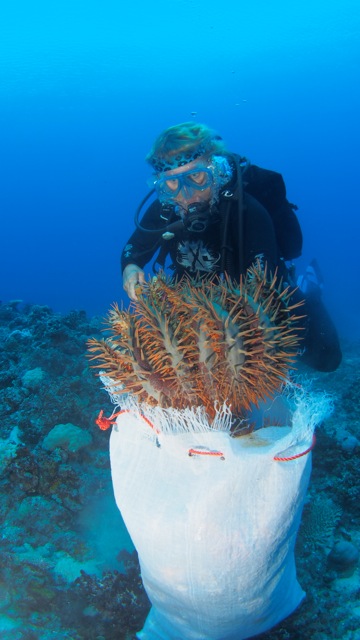Project Summary
Vanuatu is experiencing an infestation of Crown-of-thorns, an indigenous coral-eating starfish. Successful mitigation efforts by stakeholders have required all-out and sustained campaigns; however, such responses have been limited due to a shortage of resources and educational outreach. This project will fill gaps and help build local capacity. Phase 1: A multi-island circuit aboard RV Llyr to a) assess the COT infestation, b) engage with communities about controlling COT populations through sustainable fisheries practices, c) demonstrate simple culling techniques, d) share and produce videos about the issue. Phase 2: Facilitate emergency culling in key locations as COTs aggregate to spawn.
Project Background
A major aggregation of COTs was first observed on the island of Efate in 2005. As the infestation advanced, large areas of coral reefs were destroyed. Local Scuba operators and village communities became active culling COTs from healthy reefs and developed several distinct and effective COTs-culling techniques, suitable to both snorkelers and divers. Their proactive efforts at COT removal combined with ongoing maintenance — over 6000 COTs were removed between November 2012 and May 2014 — stopped a frontal line in its tracks and resulted in the protection of important coral reefs. The Nguna-Pele Marine Reserve removed 10,000 COTs in 2010 and developed a project using COTs for fertilizer production.
These efforts were models of what can be achieved, however, the lack of integrated resources across stakeholders, including available boats and effective local education and communication, has impeded coherent management of the COTs infestation throughout Vanuatu. Secondary outbreaks have been documented throughout the islands, with a recent plague identified on Espiritu Santo. A recent culling by the Dept. of Fisheries (DoF) using village manpower resulted in 1500+ COTs removed over a matter of days.
The DoF is establishing a COTs database, enlisting villagers, dive operators and tourists in a citizen-science campaign to monitor reefs and report information. Additionally, the Tourism Office has created a new position to work specifically on the development and implementation of awareness campaigns for local communities. However, resources remain limited and outreach difficult. The proposed project can help fill critical gaps and build capacity.
Project Description
On healthy reefs, Crown-of-thorns starfish (Acanthaster Planci) help maintain biodiversity. When a reef is compromised by anthropogenic vectors and/or by natural events, the ecosystem is disrupted and less resilient — as well as more conducive — to a COTs infestation. It is difficult to stop aggregations once underway and generations of COTs may plague a region, reducing coral cover by 95% and disrupting the marine food chain. Potential exists for the collapse of reefs into rubble, dooming recovery and destroying vital coastline susrge protection.
Many stakeholders around Efate and nearby islands developed campaigns to cull COTs. With sustained efforts, some of these were successful in reducing COT impacts. However, with a shortage of resources in the country, it has been difficult to implement a comprehensive and sustained management program. Many important ingredients are sorely lacking: data on the outbreak; strategic and widespread coordination of culling campaigns; and engagement with villages on sustainable fishing practices that make the best use of local ecological knowledge and scientific knowledge to protect COT predators from overfishing and increase reef resilience.
Beginning in the Austral Springtime, COTs aggregate to spawn and commence more active feeding behaviors. Now, ahead of spawning season, is an important time to collect data, cull, and offer outreach to villages.
We seek funding for a 2 Phase project.
Phase 1: Transect
A circuit of reefs and islands aboard RV Llyr, with the following goals:
a) Data collection on COT presence and impact on reefs across the archipelago. Via SCUBA and snorkel, the team will produce video transects and Reef Check survey data for sites as well as COT population counts based on the quantity removed and/or destroyed on site. This information will benefit a new database being developed by the Fisheries department in their efforts to control the epidemic.
b) Community visits. Coral reefs provide many ecosystem services to the people of Vanuatu, from food security, to storm protection, and income from tourism. The COT outbreak threatens all this. The team will meet with community representatives to hear their perspectives, speak about COTs management and mitigation using adaptive ridge-to-reef methodologies (sustainable fisheries and agricultural practices, and coastal erosion control), and demonstrate culling techniques where indicated. These visits will be video documented and footage used for production of educational films in the Bislama language. Video has been shown to be one of the most effective tools to raise awareness in Vanuatu.
Phase 2: Emergency Response
An all-out assault with snorkelers and divers to remove COTs at the onset of spawning season. Properly equipped teams, including divers and snorkelers, can effectively cull large numbers of COTs at different depths as they aggregate to spawn. Such campaigns are costly, requiring boats, dive equipment and materials, and labor. In prior efforts, these costs have been absorbed by the stakeholders, and therefore campaigns have been limited in scope. Financial support will help reinforce and facilitate the expansion of the volunteer emergency response to renewed outbreaks in Efate and the plague in Santo during a critical period.
Local Partners:
Peter Whitelaw, Secretary, Vanuatu Scuba Operators Association & Director of Sailaway Cruises.Peter is widely recognized as a local COT expert and coordinates volunteer mitigation efforts.
Sarah Graham, (MSc. Marine Ecology), Marine Biodiversity Project Officer, Vanuatu Dept of Tourism. Sarah works on the development and implementation of community awareness campaigns about COTs. Sarah joins RV Llyr as Marine Conservation Community Educator, diver and surveyor.
Local Advisers:
Vanuatu Department of Fisheries
Eric & Anne Simmons, Master Divers, producing Vanuatu Cruising Guide for the Dept. Of Tourism
This is one of the projects we’re developing this season in Vanuatu. The text is from a grant proposal we’ve submitted, so the wording is brief!


